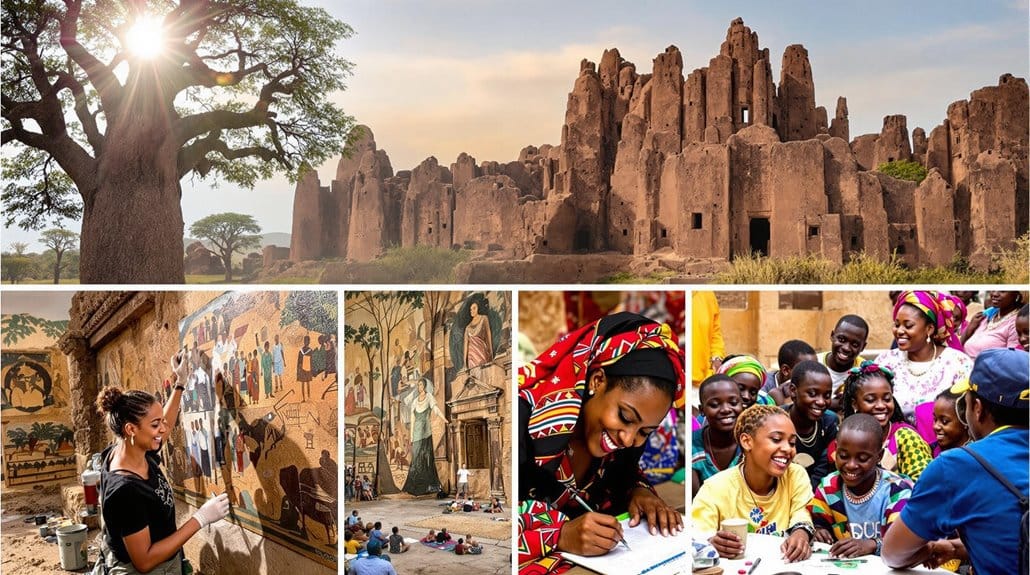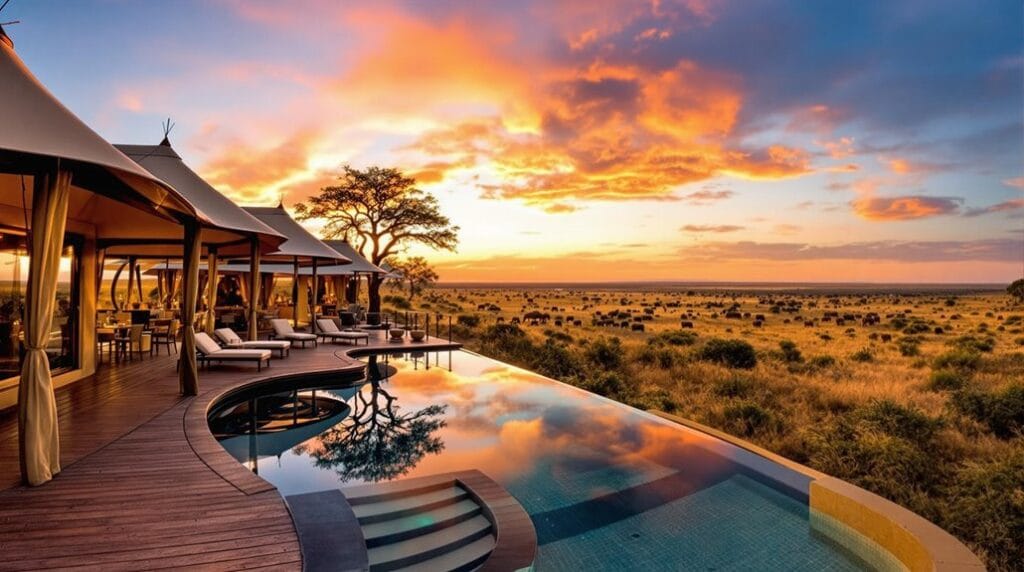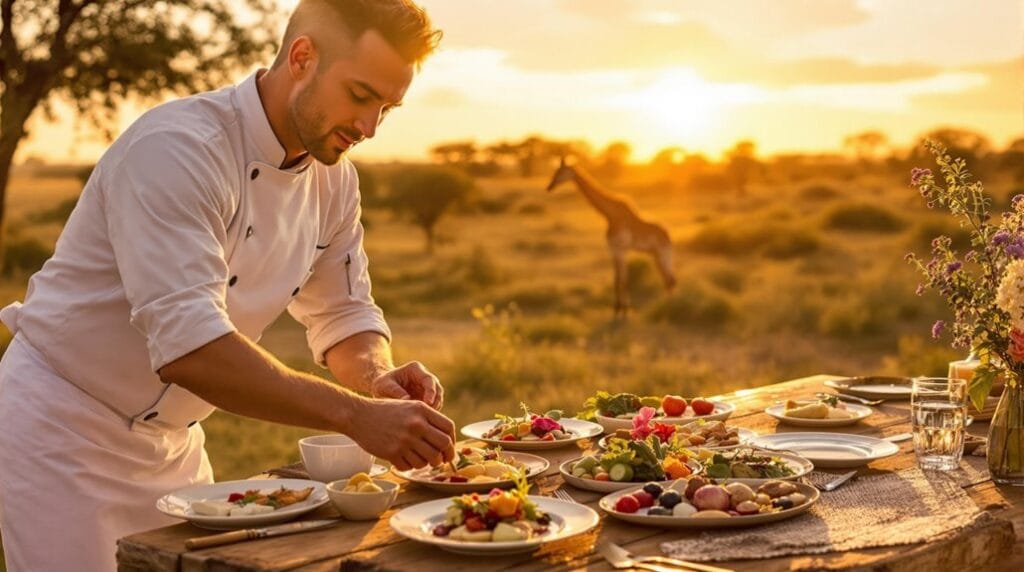Imagine standing amidst the echoes of history, where ancient stones whisper tales of resilience and culture. You might wonder how you can contribute to preserving these legacies while enriching your own understanding of diverse communities. From restoring Ghana's Cape Coast Castle to engaging in wildlife rehabilitation in South Africa, there are numerous opportunities to make a meaningful impact. Each experience not only offers a chance to give back but also reveals unique insights into the vibrant heritage of the continent. What awaits you in these transformative journeys?
Key Takeaways
- Volunteer programs in Ghana focus on restoring historical sites like Cape Coast and Elmina Castles, enhancing cultural heritage preservation.
- Educational initiatives in Zambia provide opportunities for volunteers to develop curricula, celebrating traditional practices and promoting cultural awareness.
- Archaeological research in Egypt allows volunteers to assist in excavations at UNESCO World Heritage Sites, preserving priceless artifacts for future generations.
- Community engagement in cultural heritage efforts fosters connections between locals and their history, empowering communities through volunteer participation.
- Eco-tourism projects in Namibia support wildlife conservation while educating visitors about the importance of preserving ecological and cultural heritage.
Conservation Projects in Tanzania
If you're looking to make a real difference, conservation projects in Tanzania offer incredible opportunities to protect some of the world's most stunning wildlife and landscapes.
As a conservation volunteer, you'll have the chance to engage in hands-on activities that directly impact the environment. From wildlife monitoring in breathtaking areas like Serengeti National Park to participating in anti-poaching patrols, every moment contributes to protecting endangered wildlife, including the majestic African elephant and the elusive black rhinoceros.
These volunteer projects in Africa also prioritize community education, helping to foster sustainable practices among local populations. You'll work alongside dedicated local organizations, utilizing your skills in data collection and research to promote environmental awareness.
Habitat restoration initiatives are crucial in mitigating human-wildlife conflict, ensuring that both wildlife and communities can thrive together.
With programs available year-round, you can join these crucial efforts for durations ranging from one to 24 weeks. Starting at approximately $285 for a week, including accommodation and meals, you'll find that these experiences not only enrich your life but also contribute to preserving Tanzania's rich biodiversity for generations to come.
Cultural Heritage Preservation in Ghana
Cultural heritage preservation in Ghana offers a unique opportunity to connect with the nation's rich history and vibrant traditions.
By participating in volunteer programs, you can help restore sites like the Cape Coast and Elmina Castles, which hold profound significance in the context of the transatlantic slave trade.
Engaging with local communities not only strengthens your understanding of their heritage but also fosters a sense of belonging.
You'll be part of educational initiatives that raise awareness about the importance of preserving cultural practices, ensuring these stories are passed down through generations.
Here are some emotional benefits of volunteering in Ghana:
- Preserve the past: Help maintain the narratives that shape community identity.
- Empower locals: Collaborate with residents to promote sustainable development and economic growth.
- Create lasting connections: Forge relationships with those who share your passion for cultural heritage.
Wildlife Rehabilitation in South Africa
In South Africa, wildlife rehabilitation offers you a chance to work closely with injured and orphaned animals, ranging from big cats to reptiles.
You'll learn about various rehabilitation techniques and the diverse species involved while playing an essential role in community education and conservation efforts.
Your hands-on experience not only helps these animals recover but also supports sustainable practices that protect their habitats.
Rehabilitation Techniques and Practices
Wildlife rehabilitation in South Africa plays an essential role in restoring injured or orphaned animals to health and preparing them for life in the wild. You'll find that this process involves thorough assessments of each animal's health and behavior, followed by necessary medical treatment.
Rehabilitation enclosures are designed to mimic natural habitats, allowing animals to recover while also acclimatizing them for their eventual release.
As a volunteer, you'll be part of a passionate local community dedicated to conservation efforts. Here are some key techniques you might engage with:
- Providing daily care: Feeding, cleaning, and monitoring animals to guarantee they thrive.
- Species-specific training: Helping animals regain their instinctual behaviors for survival.
- Collaboration with experts: Working alongside trained staff and local conservation organizations to adhere to ethical standards.
The combination of your efforts and those of the rehabilitation center guarantees that each animal is treated with respect and care, fostering a deep connection between you, the wildlife, and the greater mission of conservation.
Together, you can make a meaningful difference, helping these creatures reclaim their rightful place in the wild.
Species Focus and Diversity
Amidst the stunning landscapes of South Africa, the focus of wildlife rehabilitation centers often centers on a diverse array of species, particularly those that are endangered. These rehabilitation programs play a crucial role in wildlife conservation, addressing the urgent needs of species like the African lion and rhino, while fostering biodiversity conservation.
As a volunteer, you'll engage in hands-on activities that directly impact these animals' recovery. Here's a glimpse into the species you'll encounter:
| Species | Status | Role in Ecosystem |
|---|---|---|
| African Lion | Endangered | Apex predator, ecosystem balance |
| White Rhino | Critically Endangered | Herbivore, habitat shaping |
| African Penguin | Endangered | Indicator species |
| African Wild Dog | Endangered | Social hunters, ecosystem health |
| Cape Vulture | Endangered | Scavenger, nutrient cycling |
Through your efforts, you'll contribute to rehabilitation programs that partner with local wildlife reserves and conservation organizations, enhancing survival rates upon release. By participating, you're not just helping animals; you're fostering environmental stewardship and awareness within communities. Join this essential mission for our planet's precious wildlife!
Community Involvement and Education
Volunteering at wildlife rehabilitation centers not only allows you to directly contribute to the recovery of injured and orphaned animals but also immerses you in the rich cultural heritage of South Africa.
You'll gain hands-on experience in wildlife care, nurturing species like lions, cheetahs, and elephants while supporting essential conservation projects.
By joining these programs, you'll experience more than just animal rehabilitation; you'll also become part of a community dedicated to ethical wildlife care and sustainable practices.
As you engage in meaningful work, you'll foster connections that enhance your understanding of local culture.
Here are a few emotional highlights of this experience:
- The joy of witnessing an animal's recovery and return to the wild.
- The deep sense of belonging you'll feel within the local community.
- The knowledge you'll gain about conservation challenges and solutions.
Participating in wildlife rehabilitation in South Africa is one of the most fulfilling volunteer opportunities in Africa.
You'll not only help raise awareness about wildlife conservation but also enrich your life with cultural education, ultimately contributing to community development and biodiversity preservation.
Community Development in Madagascar
Community development in Madagascar offers a unique opportunity to make a meaningful impact while experiencing the island's rich culture and unparalleled biodiversity.
By choosing to volunteer in Africa, you can engage in projects that focus on sustainable agriculture, enhancing food security for local communities and preserving Madagascar's precious natural resources.
As a volunteer, you'll participate in educational workshops designed to empower residents, highlighting the significance of maintaining their cultural heritage and environmental sustainability.
These community development efforts also aim to improve access to essential services like clean water and healthcare, which can dramatically elevate the quality of life for many.
Your involvement won't only address immediate needs but also foster long-term economic growth through skills training and microfinance initiatives.
By supporting local artisans and small businesses, you help cultivate a thriving community that values both tradition and innovation.
In Madagascar, your contributions can create lasting change, ensuring that local communities continue to flourish amid the challenges they face.
Embrace this chance to connect with others and be part of a movement that uplifts both people and the planet.
Educational Initiatives in Zambia
In the heart of Zambia, educational initiatives are transforming the way local communities perceive their rich cultural heritage. By participating in volunteer programs in Zambia, you can play a crucial role in heritage conservation while fostering pride among residents. These programs often involve hands-on activities that empower the community and strengthen their connection to their history.
- Experience the joy of teaching local artisanship to the next generation.
- Witness the pride in residents as they learn about sustainable tourism.
- Feel the sense of belonging that comes from preserving cultural heritage.
Volunteers engage in curriculum development for schools near heritage sites, enhancing students' understanding of their cultural history.
You'll also find opportunities to lead workshops and cultural events that celebrate traditional practices. Through partnerships with local organizations, you can participate in community outreach programs that educate residents about the significance of protecting Zambia's diverse heritage.
These initiatives not only enrich your experience but also guarantee that local communities thrive while preserving their unique cultural identity.
Your involvement can make a lasting impact, contributing to a future where Zambia's heritage remains celebrated and protected for generations to come.
Archaeological Research in Egypt
When you volunteer in archaeological research in Egypt, you'll learn about advanced excavation techniques and methods used to uncover ancient treasures.
You'll also play a crucial role in cultural preservation efforts, ensuring that these priceless artifacts are protected for future generations.
Additionally, community engagement initiatives will give you the chance to connect with local traditions and contribute to the broader understanding of Egypt's rich history.
Excavation Techniques and Methods
Excavation techniques in Egypt play an essential role in uncovering the rich tapestry of ancient history. When you participate in an excavation, you'll engage in meticulous work, revealing artifacts and archaeological contexts that have been buried for centuries.
Teams often use a grid system, ensuring precise documentation of each artifact's location, which is important for understanding historical relationships.
Consider the thrill of discovering:
- Ancient tools that tell stories of daily life
- Intricate pottery, each piece a glimpse into artistic expression
- Burial sites that reveal customs and beliefs
Archaeologists employ tools like trowels, brushes, and shovels to carefully remove layers of soil, preserving delicate artifacts without damage.
Additionally, remote sensing technology, such as ground-penetrating radar (GPR), helps identify potential excavation sites, guiding your efforts to where history waits beneath the surface.
Cultural Preservation Efforts
Participating in archaeological excavations not only uncovers artifacts but also plays an essential role in cultural preservation efforts across Egypt. By engaging in this hands-on work, you contribute to the ongoing scientific studies that enhance our understanding of Egypt's rich history. The Egyptian Ministry of Antiquities oversees these efforts, ensuring compliance with local laws and international standards for heritage preservation.
As an international volunteer, you'll collaborate with local archaeologists on significant projects at UNESCO World Heritage Sites like the Pyramids of Giza and the Valley of the Kings. Your efforts in excavation, cataloging finds, and documenting site conditions support important conservation efforts aimed at preserving these treasures for future generations.
| Volunteer Tasks | Impact on Cultural Heritage | Collaboration Type |
|---|---|---|
| Excavation | Uncovers ancient artifacts | Local archaeologists |
| Cataloging finds | Enhances historical records | International volunteers |
| Documenting conditions | Supports conservation efforts | Cultural heritage education |
| Public awareness | Increases appreciation | Community engagement |
| Research participation | Strengthens archaeological knowledge | Collaborative projects |
Join this meaningful journey, and help protect Egypt's cultural heritage while gaining invaluable experience.
Community Engagement Initiatives
Community engagement initiatives in archaeological research in Egypt play a significant role in connecting local populations to their rich cultural heritage. By joining these efforts, you can help preserve the past while fostering a sense of pride within the community.
As a volunteer, you'll not only assist in excavation and documentation but also engage in educational workshops that empower locals.
Here are some emotional benefits of getting involved:
- Strengthening Community Bonds: You'll work alongside locals who share your passion for history, creating lasting friendships.
- Empowering Local Voices: Your efforts will help local populations take ownership of their heritage, ensuring their stories are told.
- Cultivating Skills for the Future: Workshops will provide valuable skills in tourism management and archaeological preservation.
Through collaboration between volunteers and local archaeologists, research findings are shared with the community. This approach encourages sustainable practices, ensuring informed stewardship of heritage sites.
By participating in these community engagement initiatives, you become a part of something bigger—an effort that honors Egypt's past while enriching its future.
Don't miss out on the chance to make a meaningful impact!
Eco-Tourism Support in Namibia
Namibia's eco-tourism initiatives offer a unique opportunity for volunteers to engage in meaningful conservation efforts while exploring the country's stunning landscapes. By participating in community-based conservation projects, you'll directly support local livelihoods and help protect endangered species like the desert-adapted elephants and black rhinos.
Your involvement not only aids in preserving Namibia's rich biodiversity but also contributes to responsible travel practices that benefit both the environment and local communities.
As a volunteer, you can assist in educational programs aimed at raising awareness about the ecological significance of Namibia's heritage sites. These initiatives foster a deeper understanding of the delicate balance between tourism and conservation.
You'll also have the chance to work alongside local communities, helping to develop eco-friendly tourism practices that enhance visitor experiences while safeguarding natural resources.
With eco-tourism accounting for approximately 15% of Namibia's GDP, your efforts play a crucial role in promoting sustainable travel.
Together, you and your fellow volunteers can create lasting impacts, ensuring that Namibia's breathtaking landscapes and unique wildlife thrive for generations to come.
Embrace this rewarding journey and become part of a global community dedicated to conservation and community development.
Frequently Asked Questions
Does It Cost Money to Volunteer in Africa?
Yes, it typically costs money to volunteer in Africa.
You'll encounter various volunteer expenses, including program fees that can start around $285 for a week, covering accommodation options and meals.
Travel costs and personal expenses also add up.
However, some organizations offer financial aid or low-cost options, so it's wise to do cost comparisons.
Exploring different funding sources can help make your volunteering experience more affordable and accessible.
What Organizations Have the Most Volunteers?
When considering which organizations have the most volunteers, look at those that emphasize community engagement and cultural exchange.
You'll find that organizations like IVHQ and Projects Abroad have dynamic volunteer demographics, often partnering with local communities for sustainable impact.
Their volunteer training programs enhance your experience, ensuring you contribute effectively.
Additionally, organizations focusing on impact assessment help volunteers understand their role in preserving cultural heritage, creating a sense of belonging and purpose.
What Do Volunteers Do in Africa?
When you volunteer in Africa, you engage in diverse activities like cultural preservation and wildlife conservation.
You might participate in educational programs that uplift local communities or assist in archaeological research to uncover heritage artifacts.
Community engagement is key, as you form local partnerships to enhance living conditions.
Your efforts in heritage promotion help protect traditions and support sustainable practices, creating a meaningful connection between you and the vibrant cultures you encounter.
At What Age Can You Volunteer in Africa?
You can start volunteering in Africa at age 16, with some programs welcoming youth as young as 15 for community service projects.
This age flexibility encourages youth engagement and fosters cultural exchange.
Whether you're involved in conservation efforts or educational programs, you'll gain valuable skill development while making a community impact.
Volunteering not only enriches your travel experiences but also builds connections that foster a sense of belonging and shared purpose.
Conclusion
As you explore these top volunteer opportunities at African heritage sites, remember that over 70% of Africa's population is under 30, making your contribution essential for future generations. Whether you're restoring historic sites in Ghana or supporting conservation in Tanzania, your efforts can create lasting change. Engaging with local communities not only enriches your experience but also fosters a deeper appreciation for Africa's rich cultural and natural heritage. Immerse yourself and make a difference today!








